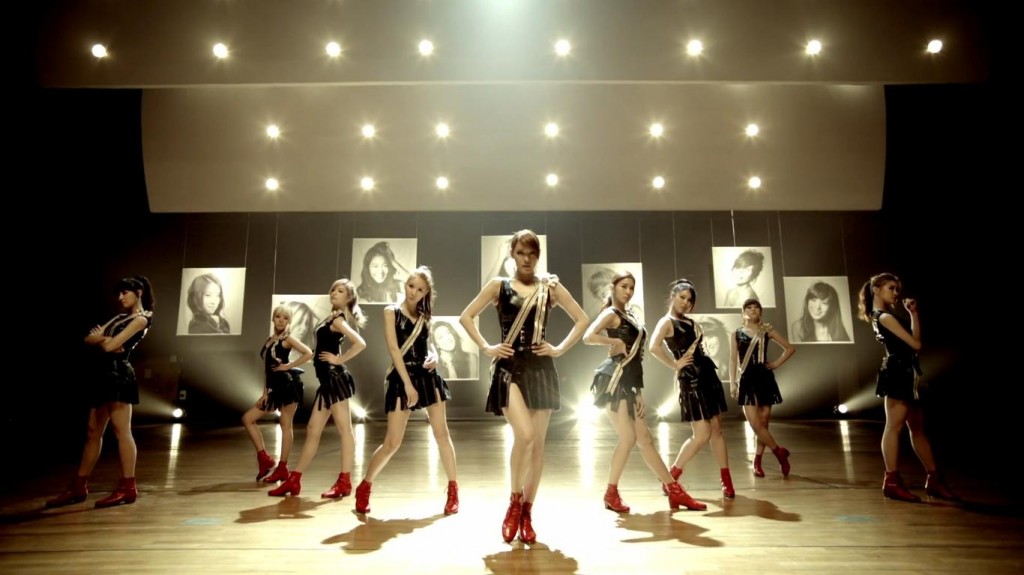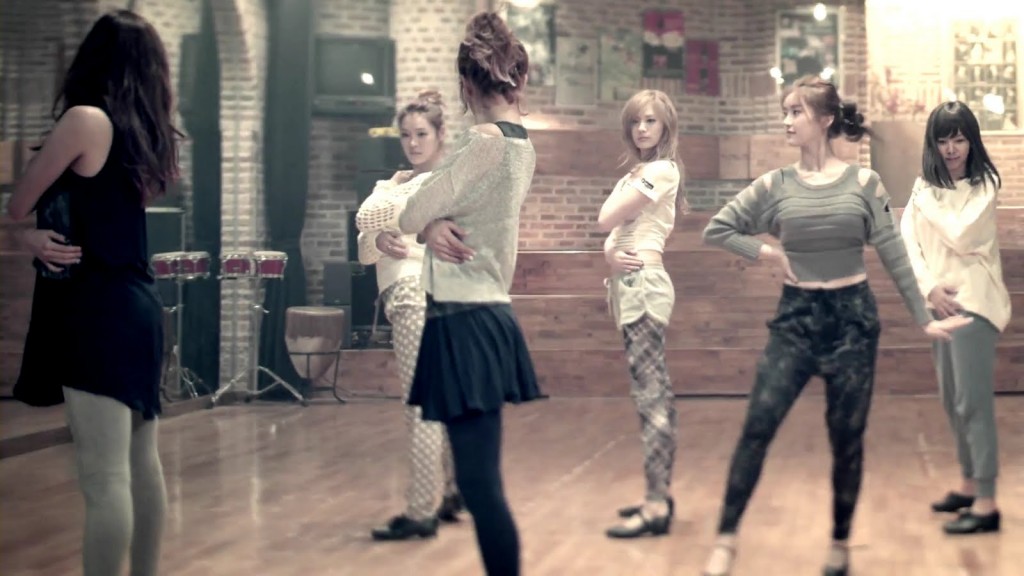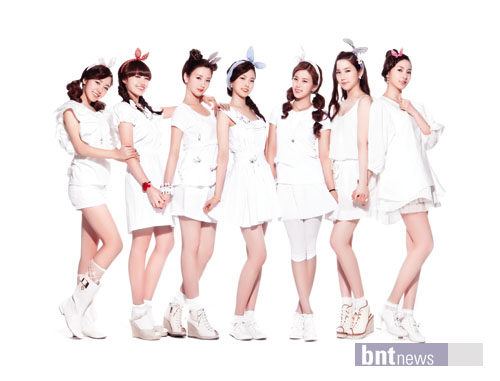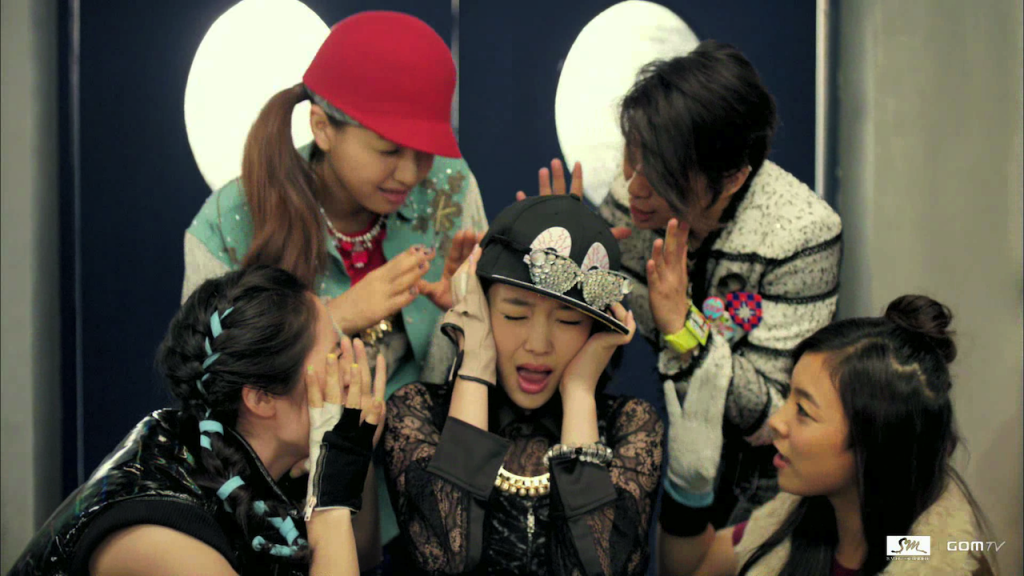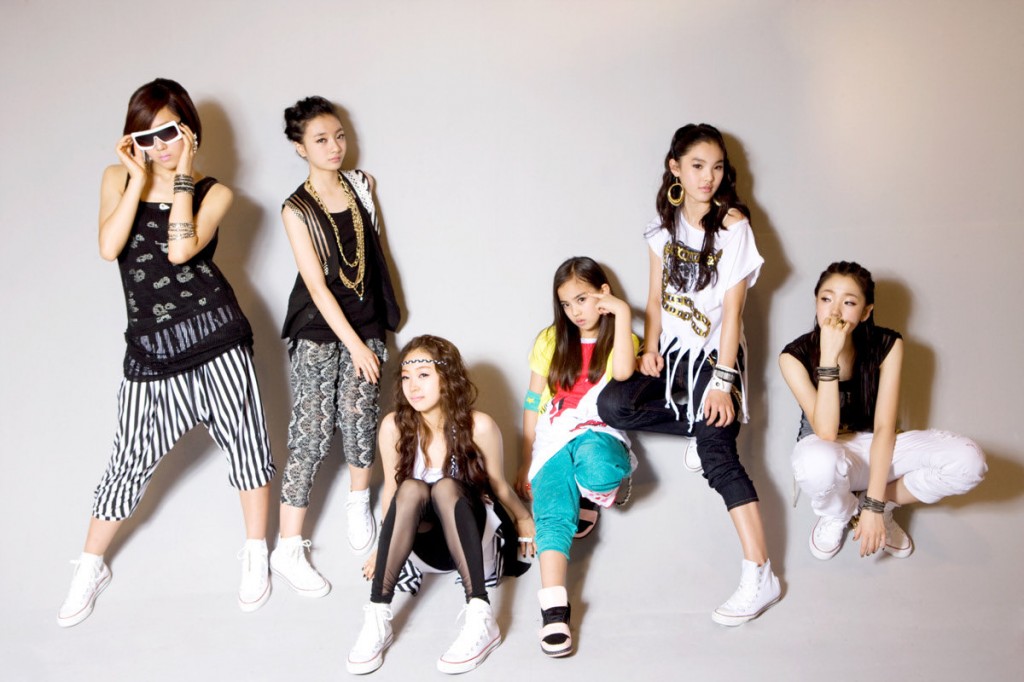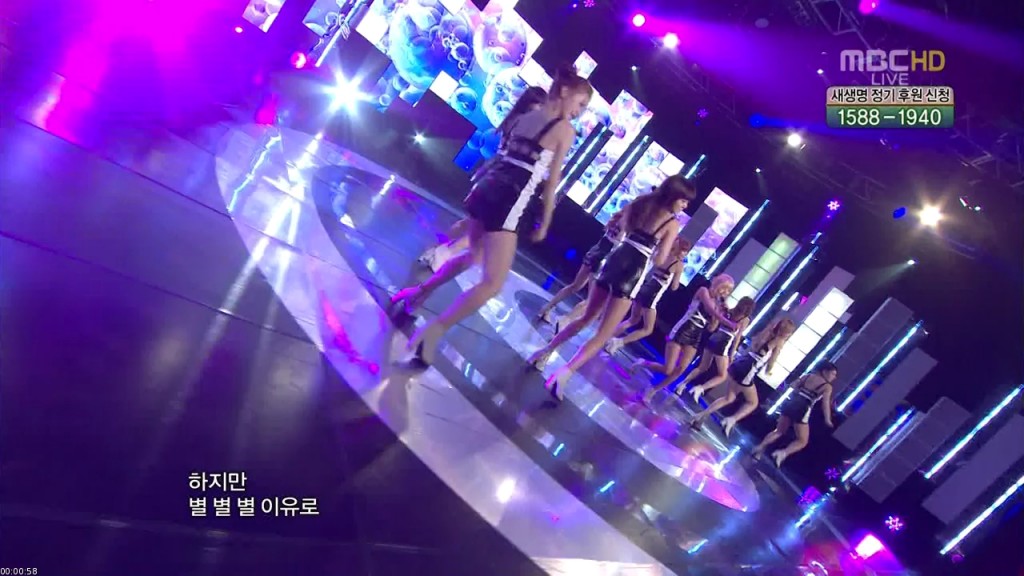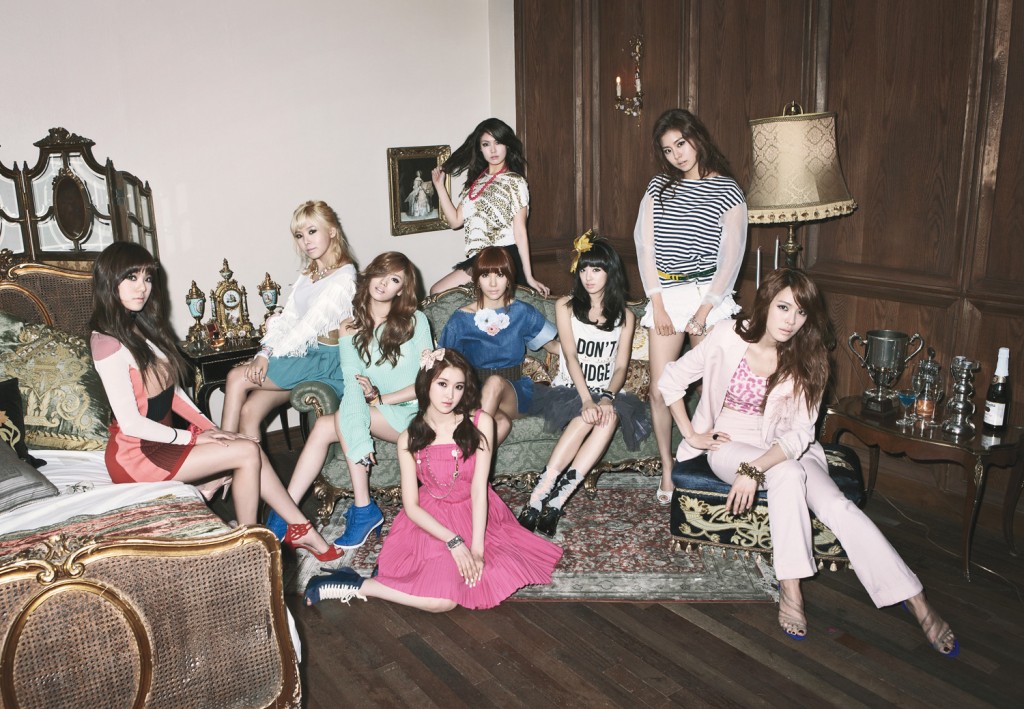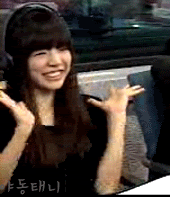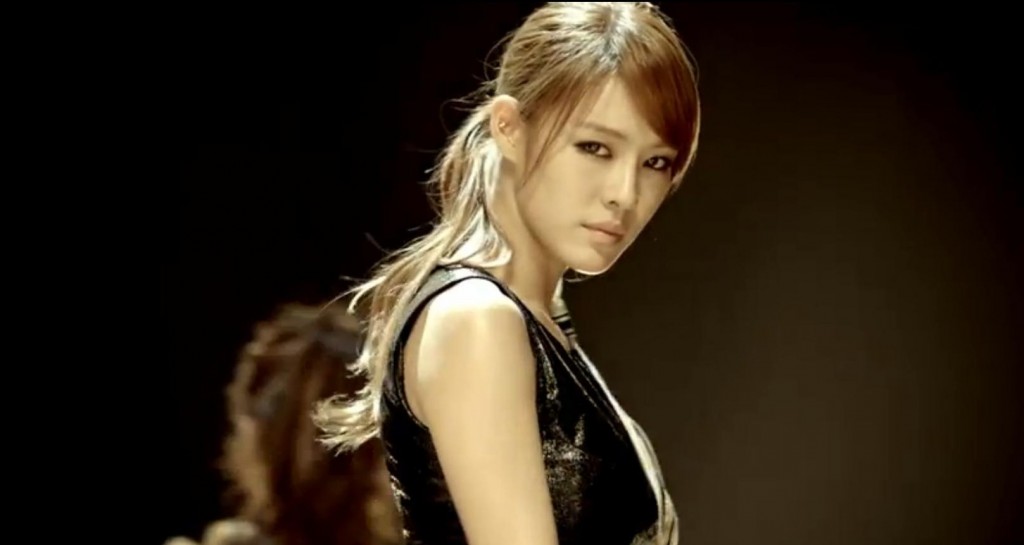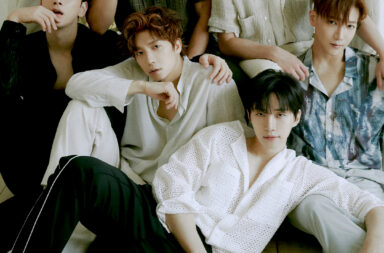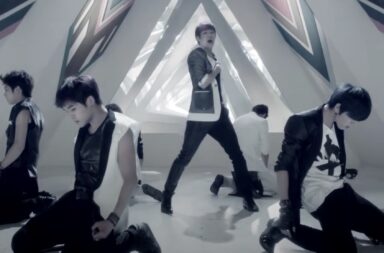Heyo! I’m finally back from the pits of finals – congratulations to those who have finished, and a big ‘hwaiting’ to those who are on their way! And, of course, there’s no better way to celebrate a comeback other than…an album review!
This review is brought to you by fellow Seoulbeat-er Ashley, who said, and I quote:
Patricia! I demand an After School album review ASAP :)
Can’t get any clearer than that. So without further ado…
1. CONCEPT/THE FORMAL DEFINITION OF ‘THE SUNBAE THEORY’
In these reviews, I talk a lot about how a group’s concept reflects the group’s position within the K-pop Hierarchy, and how the visuals perpetuated by each group directly correlates with how said group is conceived and received by the public. Current K-pop artists can be separated into two groups: the Humble Rookies who are still trying to make a name for themselves and use variety and music show appearances to propel their budding careers, and the Almighty Sunbaes who have already established themselves as household names and are just into the variety/music show thing to humor their fans. During promotions, these two groups should carry themselves in different manners. The Rookies can do whatever gimmicky things they want as long as they believe it’ll draw an audience – they are at the stage where crazy hairdos and ugly clothes and bad Engrish and even poor live performances are okay because, well, they’re still inexperienced and they (or their management) are allowed to mess up. Granted, this makes for a pretty cheap-looking K-pop scene, as most currently active K-pop artists fall within this rookie group but hey…it makes for a healthy love-hate relationship for us fans.
Sunbae artists, on the other hand, are expected to promote with a slight air of presumptuousness, even though they might not express it outright. They might not win the K-Chart for every week of their promotional stretch – but they have to perform in an equally epic manner, as if they’re expecting the trophy to fall into their hands by the end of their performance. YG usually does a pretty good job of this with Big Bang, but unfortunately, they’re the exception. SM basically failed in their efforts to promote DBSK and BoA like hotshots. As a result, these sunbae artists competed at the same level as their hoobaes who were promoting simultaneously. (If you want to hear me cry moar about this topic, check out my “Keep Your Head Down” review from a few months back.)
After School also abides by the Sunbae Theory particularly well – which is strange because After School isn’t a sunbae group at all, having debuted only two and a half years ago. However, After School also debuted at a time where the image of female artists began changing from a rather mature look (see: Lee Hyori, Bada, Jewelry, Brown Eyed Girls, etc.) to a more ‘youthful’ look that often wandered into aegyo territory (see: Wonder Girls, SNSD, and every other girl group that debuted after 2007). On top of that, girl group members started to become younger and younger. Thus, girl group concepts became less dependent on a trend, but were simply created to fit the ages of the artists. As a result, we get stuff like this:
And this:
And this.
Of course, they do this because it’s a little bit weird for girls in their teens to have a concept that’s not reflective of their age. Even when companies feel like dressing their girls up with a more ‘mature’ look, there’s often an emphasis on (toyful rather than mature) sexiness rather than mature classiness. And for good reason – I certainly don’t see f(x) donning the sleek menswear used during After School’s “Because of You” promos. It just looks silly, and there’s really no way around it until these girls get older.
It doesn’t take a genius to come up with After School’s clean, mature, and classy concept. Heck, it’s the only concept that any artist in the Sunbae Sector should be using. But with very few female sunbaes on the K-pop scene today, it looks like After School gets this “mature” concept all to themselves – and that alone propels them into pseudo-Sunbae territory, regardless of their actual value as musicians. And they milk it. Boy, do they milk it.
When we K-pop fans see something go horrendously wrong with an idol group’s concept/music/marketing/whatever, we’re quick to jump on the management – and for good reason. Like it or not, K-pop idols usually don’t have much of a hand in creating their own material. They just perform the stuff and look pretty. In the end, the management is in charge of what we love and love to hate in K-pop…but being the discerning critics that we are, we oftentimes focus on the hate.
But all I’ve got is love for Pledis with their efforts in promoting After School because it was the folks at Pledis who made After School as stellar as it could be. Shoot me for saying this, but I don’t find the members of After School to be all that impressive, talent-wise. But since the very beginning, Pledis marketed After School in just the right ways and continues to do so with Virgin.
With a lead single like “Shampoo,” it’s befitting for After School to go for a style theme centered around neutral colors and clean shapes. In terms of actual styling, there’s not much to say – but that’s probably a good thing. Many visual concepts in K-pop seem to be contrived in order to fit the song. But in the case of “Shampoo,” it feels as if the music is directly inspiring the colors and the themes that go directly into the styling.
After School isn’t a group that thrives on good concept after good concept. Rather, the concept that the group maintains as a whole is what separates it from a lot of other girl groups. Everything from the music to the styling to the choreography just seems to be a bit classier above the rest. Not necessarily better, but just classier.
2. THE MUSIC VIDEO.
I first came across “Shampoo” on MuBank when After School did their comeback performance a few weeks ago. Admittedly, I wasn’t 100 percent impressed with the song at first, but there wasn’t much to dislike about it. It was your typical three minute, forty-five second long song and dance – it was pretty, it was nice, I liked it.
Then again, that was before I knew that the actual song was over five minutes long.
Look guys, in this day and age, there is NO NEED for a pop song to be more than three and a half minutes long. Four minutes if it’s really good. But this ain’t Dvozak’s 9th Symphony, y’all. Pop music fans have short attention spans – myself included. Keep the verses tight, the choruses compact, let the members have a bit of a chance to shine…and for the love of all that is holy, do NOT insert any 15-second long instrumental breaks in the music unless it is meant to be a dance break.
I sound like I’m overreacting, but I didn’t realize how unnecessarily long this song was until I sat down, watched the music video in full, and cried from the boredom. Usually a long song is permissible if it has an interesting music video to go along with it, but no dice here with “Shampoo.” Sure, there’s clearly a story going on in this music video – but it’s so boring that it almost rivals the crappy “storylines” featured in some SM music vids. Oh yes, I went there.
I mean, what actually happens in the story? This chick sucks at tap dancing. Then she gets better at it. And somewhere along the line she falls in love with her tap instructor. Oh, and she dyes her hair blonde.
Clearly, you don’t need a five minute video to tell this story.
Before you get on my case for bashing the vid too much, it’s worth mentioning that the color usage in the video was really beautiful and well executed. Videography really is nothing more than moving photography, and there was a lot of care taken into the artistic direction of this music video. Rainbow’s “To Me” video had a similar color scheme, but the primary weakness of that video was that the color schemes were slightly different in each scene and it made the cuts look jumpy. The “Shampoo” video maintained the same color scheme throughout the video, despite the scene and mood changes. It gave the video a very clean and cohesive finish. You go, Pledis. Four for you.
3. THE PERFORMANCES.
The thing about After School – and someone’s going to flame me for this; I can feel it now – is that the members themselves aren’t all that talented. Their material is manipulated so that it works for the members – the choreography is simple and the singing lines are undemanding – but in theory, it all works towards the artists’ advantage. Their value as a group lies almost solely with their management company – which can be a very good thing, as previously discussed. However, it’s hard to hide much when it comes to live performances. The choreo for “Shampoo” is simple, effective, and well-executed, but the vocals are always shaky, and that alone can make or break the performance value of any given artist. Generally speaking, live performances are the primary venues for the singers to strut their stuff. But when there’s not much to strut…
You tap dance. Of course.
Here’s a little story. I used to perform in my high school’s musical productions every spring. And not to toot my own horn or anything, but our musicals really were no joke. Arguably, the most impressive part of our musicals was that every single member of the 50-plus member cast learned how to tap dance for the show. We drilled time steps for two and a half months’ worth in rehearsals – and by the time the curtain rose on opening night, the visual effect was pretty impressive.
My point is, it’s not all that difficult to learn how to pull off flashy tap moves in a short period of time. It’s not the same as having years and years of formal tap training, but if you’re looking to impress, then tap is the way to go. Of course, I’m not discounting After School’s efforts in any way – tap is unlike almost any other dance form and has its own set of demands. Nor do I profess to be some sort of expert on tap, so I can’t be a fair critic of After School’s tap skills.
Not that After School’s tap skills should be up for critique anyway, because that’s not the point. The purpose of implementing tap during After School’s Virgin promos is the same as the purpose of implementing the drumline routine during Bang! promos. It’s a unique point that impresses easily and sets the group apart from the rest. It’s just another brilliant move on Pledis’ part.
What was not so brilliant was the fact that the tap routine was dubbed over during the live broadcasts. Granted, it’s something that can’t be helped, considering the studio’s sound system and all that, but half the battle of learning tap is getting the sounds just right. It certainly looks like the girls know what they’re doing, but I’d love it if there was a recording of them doing the tap routine a cappella. Especially after seeing this brief rehearsal video. Look at them go:
4. THE ALBUM.
This album was a mix of some new songs, some solo songs, and some re-recordings of old singles. I didn’t think that this was a very strong album on the whole, but it seemed to me that Virgin was meant to be a showcase platform for their new single, perched atop old favorites and failsafe solo tracks for support. It’s not a bad way to go about releasing an album, but After School’s past singles were just so good that I couldn’t help but be a bit disappointed when I was in search for more.
1. “Let’s Step Up”
This is the tap dance track and serves as a fantastic opener to the album, although I don’t think it segues all that smoothly into “Shampoo.” Personally, I find the sound of tap dancing to be really neat, and I did not appreciate how the instrumental filler interacted with the tap sounds. A lot of the electronic sounds used in production sound rather similar to the sound of the tap dancing, so it was easy for the tap dancing to get lost in the song. Tap dance is highly rhythmic in itself, and I honestly believe that “Let’s Step Up” could’ve done just fine with just the sound of the tap shoes against a bass line and minimal electronic narration.
2. “Shampoo”
Once again, not in love with this song, and definitely not in love with its lengthiness. However, it still has that classy After School quality to it, which sets it apart from most recent girl group singles. It has a fresh, open quality that makes it really great for….paper writing and noraebang-ing. I don’t know why those were the two things that came to my mind; definitely says something about my life and my choices, right? Um.
3. “Virgin”
This song should’ve taken “Shampoo”‘s place on the tracklist, but I’m just nitpicking. This is probably one of the stronger tracks on the album, but it sorely lacks direction and relies too heavily on the chorus, as the verses are rather weak and awkwardly formed.
4. “Bang! (2011 New Recording)”
This awesome song is back, and so is that creepy vampire voice that made an appearance in the original recording. (Mortney Present? Is that you?)
Everything that needs to be said about this song was already said when it was first released last year, so I’ll leave it at that for now. But it’s not often that an artist re-records a previous song, and it’s interesting to make comparisons between the two versions.
5. “Play Ur Love”
Pardon my snobbiness, but anything that intentionally spells a word in chatspeak automatically gets a side-eye from me.
Just playin’. “Play Ur Love” is a pretty strong track, and allows the group’s vocalists to have a chance to shine. It’s the kind of up-tempo ballad that I’m a fan of, and it has that annoying hand-clapping synth sound that I’m not a fan of, but…beggars can’t be choosers, right?
6. “Dream (feat. Pre-School Girl Yoon-jo)”
Wait, are they actually calling the incoming After School members pre-school girls? I mean, it’s a step above calling them preschoolers, but…a little gross, don’cha think?
“Dream” feels a little too saccharine and youthful for After School’s image, and I feel like this should’ve been the B-side to an Orange Caramel single – it would’ve been better than anything Orange Caramel’s released, after all. But if you value musical diversity over consistency in concept, then by all means – this is the track for you.
One thing, though: mentioning your own group name in your own song is a definite no-no. Just look at where SHINee’s “The SHINee World” got them. The “dibidibidis” will haunt them until they’re old and grey, and I would wish that on nobody.
7. “Because of You (2011 New Recording)”
8. “Leaning Against Time (Raina Solo)”
Homegirl has a beautiful voice. What the heck is she doing in Orange Caramel?
Nice song – nothing special, but it showcases Raina very well and offers some contrast in the album. Could’ve done fine without the synthesized handclapping beat, but mostly because I hate that thing.
9. “Are You Doing Okay?”
Aaaaughh, the fact that this sounds like it’s straight off of a drama OST just kills me; the automatic association between ‘melo-ballad’ and ‘K-drama soundtrack’ really keeps me from enjoying some quality ballads. Nonetheless, it’s a beautiful song, and it soars at just the right spots.
10. “Funky Man (Nana vs. Lizzy, feat. Pre-School Girl)”
You know those songs that come up on your iTunes shuffle when your non-Kpop friends are around, and the intro alone makes you squirm in embarrassment while your friends side-eye you and judge you silently?
“Funky Man” is one of those songs.
I don’t get how this is a “versus” in any sense – I was half-expecting a rap battle, but alas, no. This feels like Hilary Duff, early 2000’s Disney Channel fodder.
Also, Pre-School Girl doesn’t even get her real name mentioned in the title? Poor thing.
11. “My Bell (Jung-ah Solo)”
Ballad. Not quite in OST territory and slightly up-tempo-ish, but not quite in full up-tempo ballad territory. Man, I really should make a “K-pop Ballad Scale” for these things, right?
12. “When I Fall (2011 New Recording)”
This re-recording has changed drastically from the original; they’ve eliminated the acoustic guitar and given it a more bassy, rounder feel. The chorus is really dramatic, with a string background and a stronger rhythm section. I definitely prefer this version over the original, even if it sounds a bit busy at times.
13. “Shampoo (Radio Edit)”
Looks like Pledis anticipated my whining about the length of the original song and added this 3:30 version of the song to the album. On top of things as always, Pledis.
Man, I really wish that the names of the composers/producers responsible for After School’s music were readily available on the int3rw3bz, because it just kinda baffles me that After School’s lead singles are so consistently good whilst their album B-sides are so painfully mediocre. Virgin was After School’s first attempt at a full length album, but as previously discussed, this album sounded more like a platform for “Shampoo” and not much else. A bit disappointed…but to be perfectly honest, my interest in this album isn’t as much vested in the music as it is in After School’s image as a whole.
There aren’t a lot of girl groups out there that can claim their place in the K-pop Sunbae Arena, and many of those who can usually don’t act like, well, sunbaes. Maybe it has something to do with the general humble attitude and ‘rookie mindset’ that’s present throughout the K-pop industry, but I think there’s a difference between having class and being arrogant about one’s seniority. After School is a good example of this, especially since they don’t actually have the seniority to back up their pseudo-sunbae attitude. But regardless, everyone knows After School as the “mature” girl group and respects them as such. They don’t win music awards by the drove (not as if the whole K-pop award institution is corrupted anyway), but there’s just something about them that is untouchable, occasionally awe-inspiring and, above all, different. With the jillions of girl groups flooding into the market this year, it’s natural for well-established girl groups to feel a little threatened. But I don’t think After School has anything to be afraid of. It’s not as much a matter of popularity, as After School doesn’t have a huge fanbase to begin with. But they command respect, and they exude classiness. And people appreciate that.
